The Models
By iCareer Climber Team on 6 July 2018
[1] Document Similarity Model

We provide career recommendations in a ranked order based on the similarity of a job seeker’s current job experiences. Our model is powered by resume information across the US. This product is a proof of concept and contains a small subset of possible jobs (114 unique job titles). The list of jobs is derived from the availability of salary and resume data. We selected all jobs that contained at least 100 salary records in the past 5 years and 500 resume job summaries in the past 10 years.
Model Parameters
Number of Classes:
114
Train-Test Split:
222,978 / 11,736 (95% / 5%)
TD-IDF Vectorizer:
Min_df: 5
Ngram_range: [1,3]
Undersampling:
More common jobs were undersampled to 2500 records based on job recency.
Oversampling:
Less common jobs were oversampled to 2500 records using the regular Synthetic Minority Over-sampling Technique (SMOTE).
Multinomial Naive Bayes Classifier:
Alpha: 0.02
Model Performance
Performance
| Metric | Result |
|---|---|
| Accuracy | 48.86% |
| F1 Score | 46.14% |
| Precision Score | 47.60% |
| Recall Score | 47.55% |
Lowest/Highest Precision
| Class | Precision | Support |
|---|---|---|
| consultant | 9.09% | 131 |
| business consultant | 11.76% | 48 |
| director | 16.67% | 119 |
| manager | 21.21% | 127 |
| it specialist | 22.22% | 64 |
| build and release engineer | 82.22% | 131 |
| database administrator | 83.47% | 123 |
| caregiver | 86.67% | 66 |
| android engineer | 88.89% | 61 |
| ios engineer | 89.58% | 52 |
Lowest/Highest Recall
| Class | Recall | Support |
|---|---|---|
| consultant | 1.53% | 131 |
| business consultant | 4.17% | 48 |
| manager | 5.51% | 127 |
| engineer | 7.63% | 118 |
| director | 10.92% | 119 |
| build and release engineer | 84.73% | 131 |
| salesforce engineer | 85.09% | 114 |
| android engineer | 91.80% | 61 |
| net engineer | 91.82% | 110 |
| technical recruiter | 94.95% | 99 |
Lowest/Highest F1-Score
| Class | F1-Score | Support |
|---|---|---|
| consultant | 2.61% | 131 |
| business consultant | 6.15% | 48 |
| manager | 8.75% | 127 |
| engineer | 12.77% | 118 |
| director | 13.20% | 119 |
| database administrator | 82.79% | 123 |
| build and release engineer | 83.46% | 131 |
| technical recruiter | 85.45% | 99 |
| ios engineer | 86.00% | 52 |
| android engineer | 90.32% | 61 |
Most Confused
| Actual Class | Predicted Class | Cases |
|---|---|---|
| accountant | staff accountant | 38 |
| marketing director | marketing manager | 35 |
| java software engineer | j2ee engineer | 32 |
| associate | cashier | 31 |
| network administrator | network engineer | 30 |
| manager | general manager | 28 |
| assistant | administrative assistant | 26 |
| design engineer | mechanical design engineer | 26 |
| process engineer | manufacturing engineer | 25 |
| project manager | it project manager | 25 |
PCA Analysis
We performed a PCA analysis to test the clustering results from the TD-IDF vectorization of job summaries. The vectors were reduced to a 3-dimensional space and put into the Embedding Projector website. The below results show that different job summaries for the same job share a lot of the same skills and language.
- Below are the 500 closest job summaries to a randomly selected Android Engineer job summary. Many of these job summaries have the job title Android Engineer indicating that Android Engineers view and describe their roles similarly.
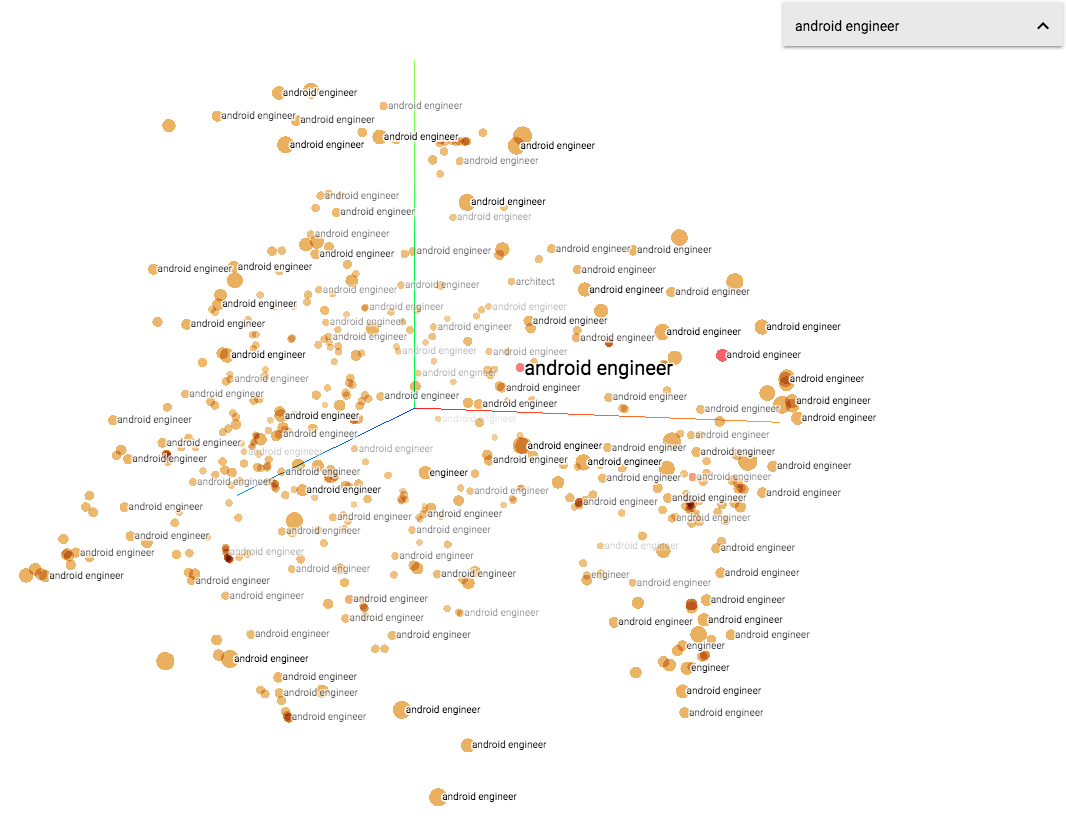
- Below are the 500 closest job summaries to a randomly selected Consultant job summary. Many different job titles are represented in this group. It appears the role of a Consultant is much more variable than that of an Android Engineer.
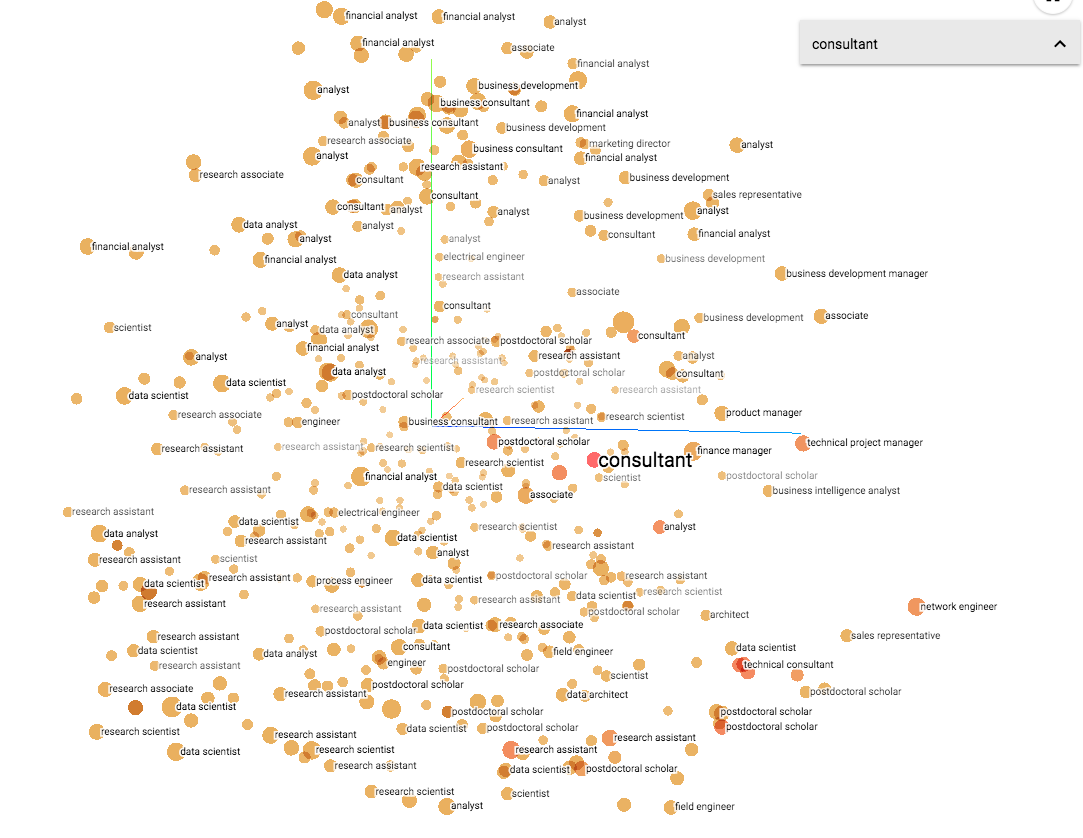
- Just for fun, we selected a random Data Scientist job summary. The Data Scientist role appears to be at the intersection of data analysis, engineering, product management, and research. ;)
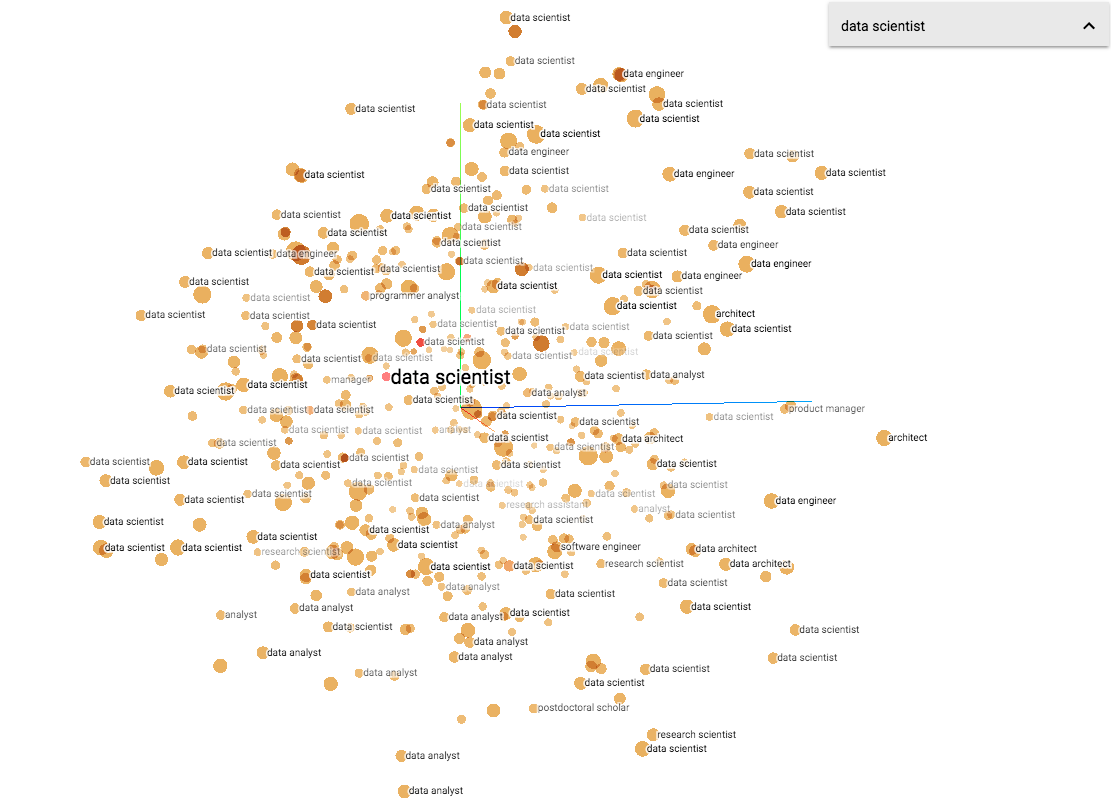
To play with the data yourself, you can input our vector file and metadata file to this website: projector.tensorflow.org
Example Output
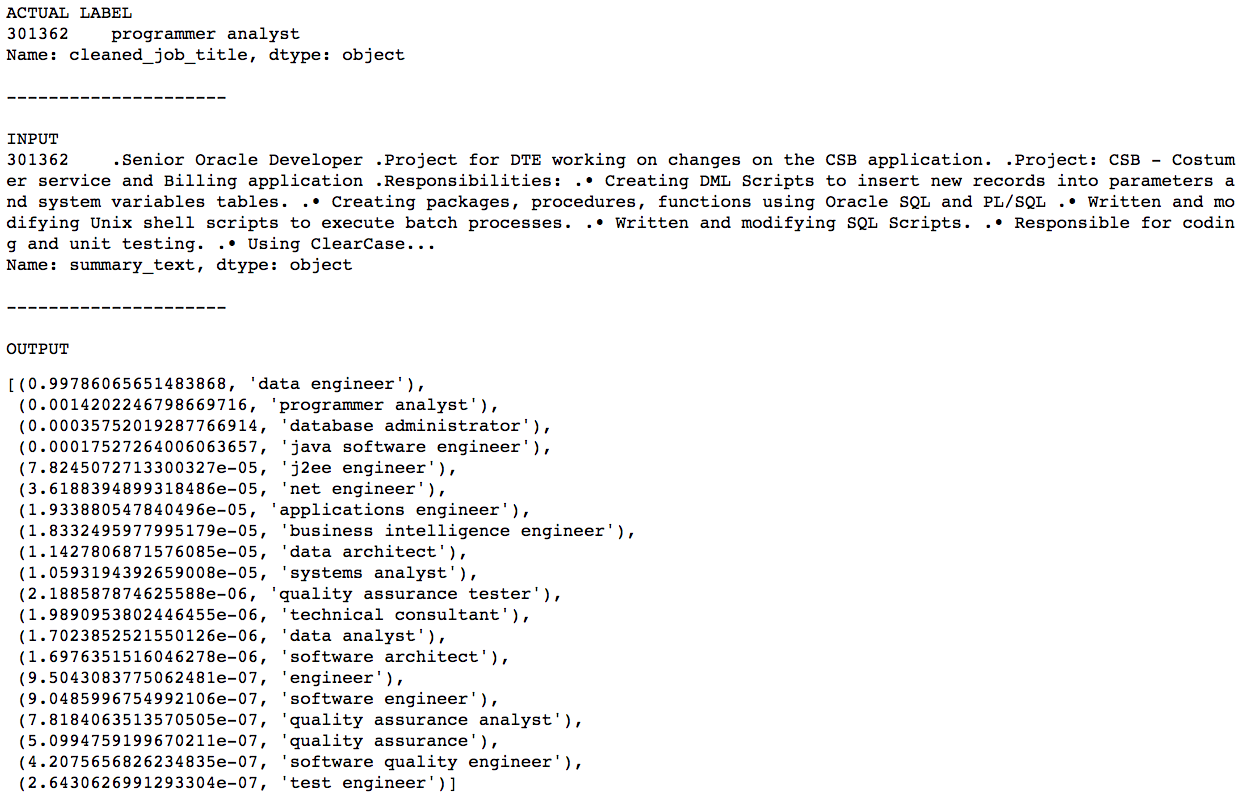
[2] Job Skills Model

To produce useful skills information, we created a model like the Document Similarity Model with a few differences.
Model Parameter Differences
Train-Test Split:
325,787 / 17,147
TD-IDF Vectorizer:
Ngram_range: [3,3]
Undersampling:
Common job undersampling to 5000 records
Oversampling:
SMOTE oversampling to 5000 records
Model Performance
| Metric | Result |
|---|---|
| Accuracy | 39.30% |
| F1 Score | 35.57% |
| Precision Score | 36.70% |
| Recall Score | 36.12% |
Example Outputs
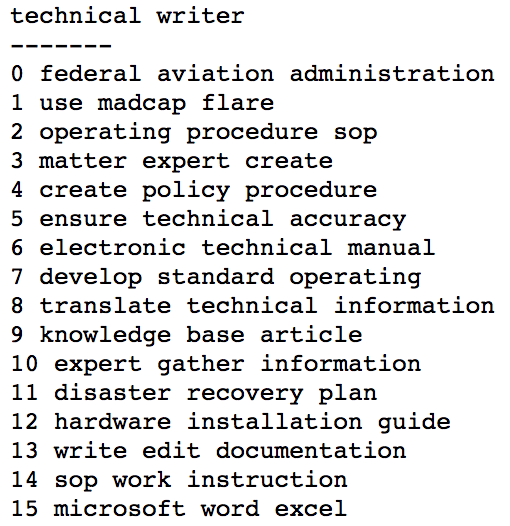
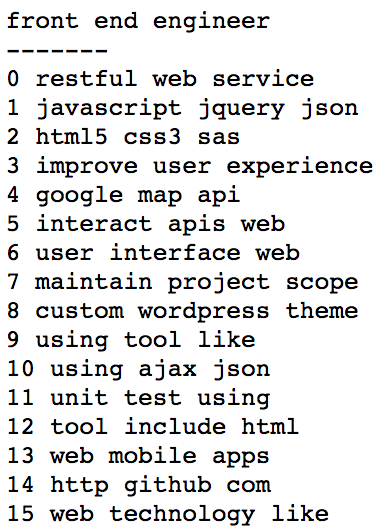
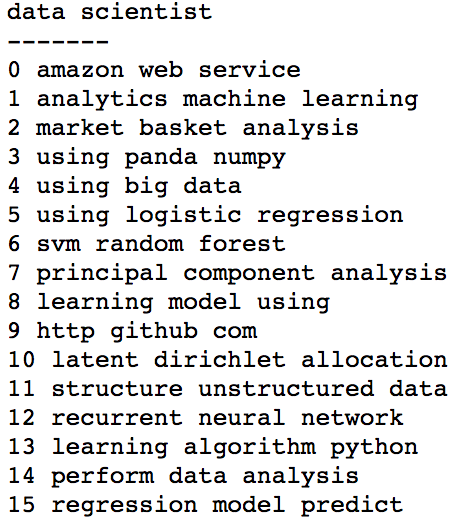
[3] Time-Based Model (Not Productionized)
The resumes we collected contained a large number of software engineering roles, so we thought it would be interesting to create a classification model to derive the most important software engineering skills throughout time. Below are the highest weighted skills for each time period. This model is not included in the app.
Model Parameters
Number of Classes:
5
Train-Test Split:
62,440 / 3287 (95% / 5%)
TD-IDF Vectorizer:
Min_df: 0
Ngram_range: [2,4]
Oversampling:
Classes were balanced using the regular Synthetic Minority Over-sampling Technique (SMOTE).
Multinomial Naive Bayes Classifier:
Alpha: 0.1
Model Performance
| Class | Precision | Recall | F1-Score | Support |
|---|---|---|---|---|
| Earlier-1998 | 67.66% | 57.38% | 62.10% | 474 |
| 1998-2003 | 46.68% | 42.27% | 44.37% | 466 |
| 2003-2008 | 45.39% | 40.85% | 43.00% | 639 |
| 2008-2013 | 43.86% | 56.57% | 49.41% | 776 |
| 2013-2018 | 70.46% | 67.06% | 68.72% | 932 |
Results
Technology is one of the fastest changing industries. From this model, we can see the rise to prominence and the fall of different software engineering tools throughout time.
| Earlier-1998 | 1998-2003 | 2003-2008 | 2008-2013 | 2013-2018 |
|---|---|---|---|---|
| development team | database design | unit testing | management system | version control |
| test plan | rational rose | crystal report | html cs javascript | unit testing |
| window nt | client server | java j2ee | test plan | web application using |
| software design | vb net | net asp net | data access | visual studio |
| customer support | crystal report | web base | front end | full stack |
| tcp ip | using visual basic | software development | sql query | develop maintain |
| programmer analyst | store procedure | oracle 9i | design implement | store procedure |
| cobol ii | software application | html cs | java j2ee | technology use |
| ibm mainframe | tcp ip | develop test | visual studio | new feature |
| client server | pl sql | store procedure | new feature | code review |
| system use | technology use | role responsibility | using asp net | agile scrum |
| assembly language | user interface | window xp | unit testing | rest api |
| user interface | data warehouse | team member | application use | design implement |
| device driver | development team | design implementation | user interface | using asp net |
| develop implement | html javascript | business logic | web base | entity framework |
| using visual basic | responsibility include | visual basic | software engineer | management system |
| vax vms | operating system | management system | business logic | development team |
| pl sql | technical support | user interface | code review | software engineer |
| responsibility include | web service | net sql server | responsibility involve | sql server |
[4] Next Steps
Currently, these models consider similar ngrams like
accounts payable balanceandorganize accounts payableto be completely different phrases. We want to explore different vectorization models, like Doc2Vec and OpenAI Transformer, to place similar ngrams closer to each other in the vector space.We will expand the number of classes used in the model.
We are interested in incorporating a time component to the app. Can we model changes in job skills over time?